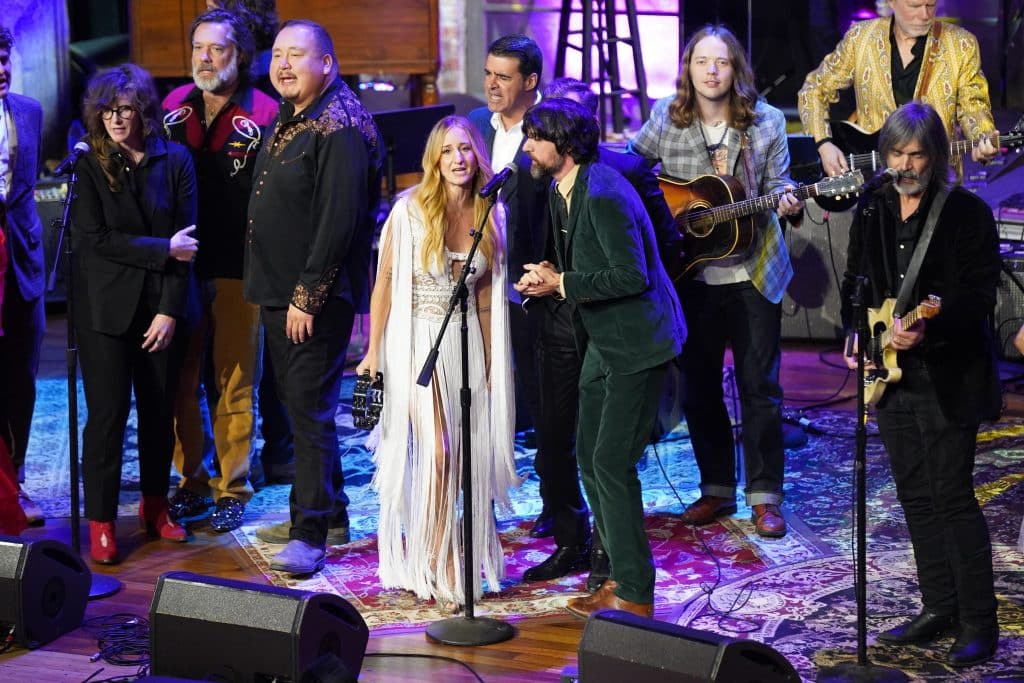Features
Americana Awards Celebrate Breadth Of An Expansive Genre

The winners, honorees and performers at the 22nd annual Americana Honors & Awards at Nashville’s Ryman Auditorium demonstrated the breadth and depth of what is an expansive — and often inscrutable — genre.
Wednesday’s show is centerpiece event of the five-day Americana Music Festival and the genre’s self-celebration demonstrates perfectly the ongoing, never-ceasing difficulty the genre has putting boundaries and brackets on itself.
There was perhaps a time when Americana really just was country music that couldn’t sell or that was too good to be on the radio (or both). And to a degree, artists who meet that definition still get called Americana rather than country for no good reason. Adeem the Artist’s performance of “Middle of a Heart” was a gut-wrenching, nuanced, complicated, heartbreaking examination of coming-of-age in rural America. And it’s a straightforward country song. And though Adeem has played the Opry and finds radio play on the fringes of country, they are still considered more Americana than country.
But Americana now encompasses far more than countrified roots music (or rootsified country music). Soul and blues songstress Bettye LaVette won the Legacy of Americana act and her performance was a smoky-room blues stage-strutter, after all.
And perhaps Americana’s expansiveness is the point. Isn’t America supposed to be expansive? Isn’t America supposed to embrace its people and all their foibles and all their contributions and come out the other side with something better?
Americana is now more than an ever a worldwide genre; in addition to Canadians, Brits and Australians who have embraced by the Americana scene, one of the night’s best demonstrations of virtuosity came from Ecuadorian-Swiss duo Hermanos Gutiérrez, playing from their album of songs inspired by spaghetti westerns. Sometimes we need outsiders to tell us truths about ourselves (or tell good stories about us, at least).
Americana is a genre defined by a feeling and what it evokes. Just as every year, the festival is greeted with thinkpieces — add this one to the canon — about what Americana is (and is not), every year Americana Music Association executive director Jed Hilly makes a joke alluding to Supreme Court justice Potter Stewart’s famous test in Jacobellis v. Ohio.
You know it when you see it. Or hear it, at least.
And though the genre is rich in recording tradition, its often stark simplicity emphasizes live. The awards show reflects that. There are just six annual awards — for album, artist, duo or group, song, instrumentalist and emerging artist — in addition to a similar number of lifetime achievement awards, which allows plenty of space for performance during the three hours-plus of the fete.
The show began with a poignant cover of Jimmy Buffett’s “Come Monday” by Logan Ledger standing alone and ended with a virtually all of the night’s performers and honorees crowding Nashville’s most famous stage in a raucous singalong of “Up On Cripple Creek” to honor Robbie Robertson. The Band, perhaps, being the only indisputably Americana group ever (mostly made up of Canadians, of course).
In between, the crowd was treated to, among others, 49 Winchester’s Appalachian country-rock, what might have happened if Alabama and the Allmans formed a supergroup in some West Virginia holler. Allison Russell — who won the Spirit of Americana honor for her work organizing the “Love Rising” concert — made her banjo a centerpiece of “Eve Was Black,” a rock and soul celebration that could have come out of a Detroit garage. S.G. Goodman, the Emerging Artist winner, was smart and vulnerable and strong and honest, sounding like Patsy Cline pushed forward 60-someodd years (or launched on a rocket). Bonnie Raitt, who won for Song of the Year, sounded as perfect as ever and no one was suprised. William Prince sounded as lovable and whipsmart as John Prine. Rufus Wainwright’s voice was as clear as a church bell, even while covering “Ol’ 55” by Tom Waits, whose voice is more gravel-in-the-church-parking-lot.
The self-deprecating Milk Carton Kids served as the Martin & Lewis for the night, and got their pal Noah Kahan to join them to cover Paul Simon’s “American Tune.” Perfect.
Billy Strings won the night’s top honor as Artist of the Year, and took over lead guitar duties on the “Cripple Creek” cover from Buddy Miller, who has the honor of crafting the house band every year (and this year got to present the Lifetime Achievement for Executive to New West’s George Fontaine Sr.), which provided expert backing all night, including during the churchy performance of “Stretch Out” by The War & Treaty (who won Duo/Group of the Year) while giving space for the audience to appreciate SistaStrings, who won Instrumentalists of the Year.
Tyler Childers is on tour and wasn’t on hand to accept his Album of the Year honor for Can I Take My Hounds To Heaven? (a country-gospel record, by the way)
One thing the Americana Awards does is make sure to honor artists with lifetime achievement awards while they are still vital and touring. Trailblazer Award winners Nickel Creek’s members are just in their 40s, even though it seems like their boundary-busting bluegrass has been around for too long for that to be true. Songwriting Achievement winner Patty Griffin is still writing songs better than virtually anybody.
To emphasize how important live is to Americana, the next-to-last honor announced, upstaged only by Artist of the Year, was the lifetime award for performance, won by the Avett Brothers, who are still very much a going concern.
Much like Americana itself — going and growing and evolving. Sometimes sounding as old as the hills and sometimes as futuristic as a space cowboy. But always, as Nickel Creek’s Chris Thiele put it perfectly, Americana is there with “the widest open ears.”